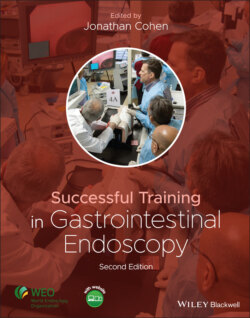Читать книгу Successful Training in Gastrointestinal Endoscopy - Группа авторов - Страница 142
Intermediate cognitive skills
ОглавлениеThe intermediate cognitive skills in colonoscopy hinge on a trainee's ability to recognize abnormalities and the decision‐making abilities of what to do about them. As discussed earlier in this chapter, the skill of recognizing patterns of pathology simply requires numerous encounters with various abnormal findings. As the trainee develops the ability to recognize patterns of pathology and their sometimes subtle differences, management decisions will become more refined as well. Instruction in this cognitive skill predominately rests on ensuring that fellows experience a wide variety of findings during patient‐based endoscopy. However, if patient exposure is the only means of education, a trainee's ability to recognize certain abnormalities could be limited due to patient selection biases or inadequate volume of certain abnormal findings (i.e., many polyps in a given practice but limited exposure to various presentations of inflammatory bowel disease). Instead, patient‐based training should be augmented with self‐directed study of photo atlases and multimedia resources that have been identified by instructors to ensure a wide variety (and more importantly, greater repetition) of pathology is experienced by the learner. One such media source is the GI Leap learning site of the American Society for Gastrointestinal Endoscopy. This online site (www.asge.org/home/advanced‐education‐training/online‐learning‐gi‐leap/gi‐leap‐lp) provides many examples of endoscopic images and videos along with case reports and explanations to accompany them. Contributions to the site are peer reviewed by its editorial board and review panel made up of nationally recognized names in gastroenterology. The site also has a curriculum specifically designed for fellows to ensure that a broad spectrum of endoscopic findings is experienced.
Assessment of pathology recognition skills is relatively simple. The most common method is from instructors getting a sense of the fellow's ability to identify pathology during live cases, yet the results of such assessment is rarely recorded in any manner. Formal objective assessments (written tests) can also be developed where images or videos can be presented to trainees at various stages of their training. The trainees can then be graded based on how quickly or accurately they can identify what is depicted. Results of such testing can be used to document the progression toward cognitive competence and could also lead to earlier identification of deficiencies and timely remediation in some cases [35].
In addition to pathology recognition, the intermediate cognitive skills include the ability to make appropriate management decisions during endoscopy (such as what requires therapy, what devices to use, and what settings to use). This requires a broad fund of knowledge gained from bedside teaching, self‐directed learning by reading texts, and supplementary study aids. One such supplement is the GI endoscopy self‐assessment program (GESAP) developed by the ASGE. This resource is a computer‐based program that provides board‐exam‐type questions with endoscopic images focusing on both diagnostic and therapeutic decision skills. Software such as this can not only provide more repetition with seeing endoscopic pathology but also challenges a trainee's decision‐making abilities. More importantly, the program provides instant feedback with explanations of the correct answers that can be used for self‐assessment and study purposes. At the bedside, these skills will be honed as a trainee's experience with different pathology grows.
The assessment of decision‐making skills is also relatively straightforward. The most common method is again an informal assessment during patient‐based training as instructors take a trainee through the thought process regarding management of specific findings. This “Socratic” teaching method with an actual case is not only one of the most effective teaching methods but is also a very effective form of formative assessment that imparts to the instructor a sense of what the fellow knows and how they come to their management decisions. As a result, feedback on errors in reasoning can be corrected on the spot. Assessment of this requires follow‐up to ensure that the same errors in reasoning have been corrected. To accomplish this, a more formal and reproducible means of assessment is needed. Assessment must be an ongoing process that requires a means to record and evaluate progress in a trainee's skills. A standardized skill assessment form can be used. An assessment tool of this type should ideally be completed by staff during each case and measures a broad spectrum of both cognitive and motor skills, including the knowledgeable selection of device and settings based on pathology encountered. More will be discussed about how to employ this type of ongoing assessment later in this chapter.
